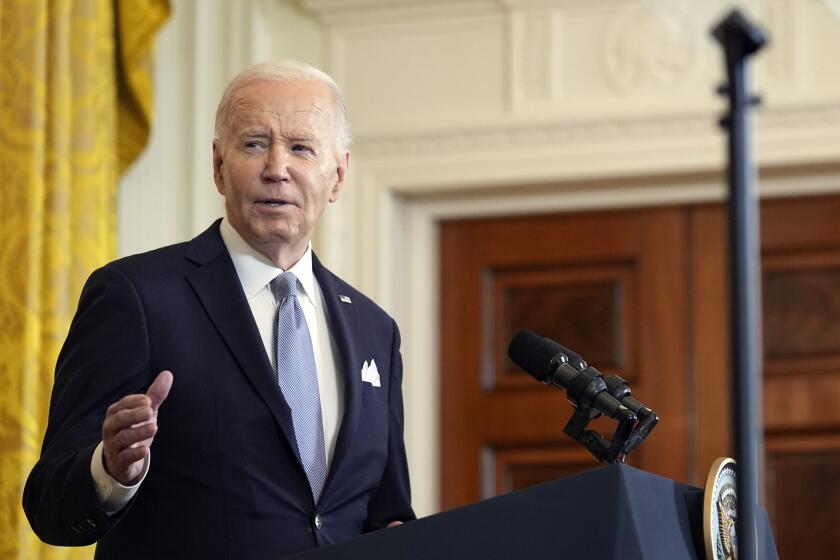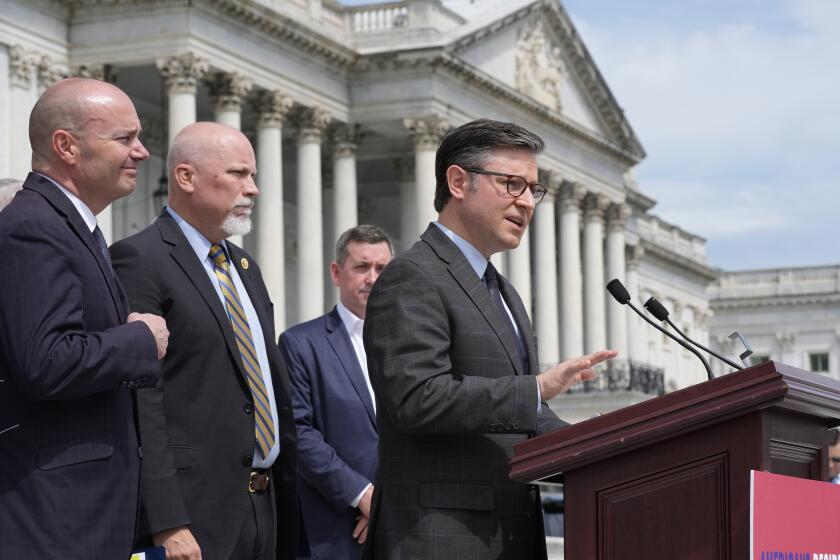Column: Red states don’t like ‘Zuckerbucks’ donations? They should pony up more public funds for elections

Democracy isn’t free.
Tell that to the more than half the states that have banned or limited donations to the roughly 8,000 county and municipal offices that run our elections.
Opinion Columnist
Jackie Calmes
Jackie Calmes brings a critical eye to the national political scene. She has decades of experience covering the White House and Congress.
The beleaguered public servants who make it possible for us to cast ballots, whether for school boards or the presidency, are already woefully underfinanced. Now the Big Lie that won’t die — that the 2020 election was stolen from Donald Trump — is making that underfunding worse.
Red (and reddish) states have bought into the obnoxiously dubbed “Zuckerbucks” conspiracy, a far-right falsehood that in 2020, Mark Zuckerberg and his wife Priscilla Chan funneled hundreds of millions of dollars to election offices not for the stated reason — to pay for costly protections against COVID-19 — but to help Democrats win. (Just how they supposedly achieved that the conspiracists don’t say.)
Election offices’ need for the money is evident from coast to coast. A 2021 study by the MIT Election Data and Science Lab found that the U.S. investment in our voting system falls “near the bottom of spending for public services, ranking at approximately the same levels as spending by local governments to maintain parking facilities.”
Trump’s stunning accusation that the FBI and the president were ‘ready to take me out’ should have been met with forceful, immediate outrage.
Yet maintaining parking lots isn’t anything like contending with the complexity and costs of modernizing and securing voting machines; investing in better ballot counting and voter registration technology; staffing and running polling centers; combating disinformation, AI scams and cyberattacks, and protecting against the threats of violence that have become a fact of life for election officials and their staffs in the Trump years.
Despite the crying needs of voting administrators, 28 states — 22 red ones and six swing states — have prohibited or restricted philanthropic funding for their election offices since 2020. Of those, only Pennsylvania paired its ban with offsetting state funds. It’s a double-whammy: no private money, yet skimpy public funds. As much as we might prefer that our elections aren’t subsidized by private interests, if states aren’t going to pony up more public dollars, let the charity flow.
States and local governments have historically had the most responsibility for voting under our decentralized election system, and the federal government chips in pitifully little. Yet MAGA Republicans in Congress want to get in on the anti-Zuckerbucks craze and extend the ban on election-administration donations nationwide. As early as next month, the House could vote on an “election integrity” package that’s anything but, and which includes a so-called End Zuckerbucks Act.
If you oppose right-wing activism among federal judges and justices, vote strategically in November.
Fortunately, if it were to pass in the House, the bill would almost certainly be buried in the Senate. But that still leaves the state bans in effect across wide swaths of the country — including such pivotal and hotly contested states as Pennsylvania, Arizona, Wisconsin and Georgia.
“What we’ve seen is not only is there not an investment in election departments in a way that ultimately will make them successful and keep our election process secure, but also a really concerted effort to cut off other avenues” of support, Tiana Epps-Johnson, executive director of the nonprofit Center for Tech and Civic Life, told me.
The center, whose mission is to promote election modernization and civic engagement, distributed most of the $420 million that Zuckerberg and Chan donated in 2020. The grants went to more than 2,500 government entities in nearly every state and Washington, D.C. — every election office that applied. The nonprofit Center for Election Innovation and Research doled out the rest.
The still-insufficient progress the U.S. is making on climate change could be undone with the wrong outcome in November.
To put the Zuckerberg-Chan gift in perspective, it was nearly eight times greater than the $55 million that the federal government is providing to election offices this year. The grants, as advertised, mostly paid for COVID-response measures necessary to safely conduct the 2020 elections: to buy masks and other personal protective equipment, supply and handle many more mail-in ballots, hire and train additional staff and reach out to wary voters.
But the funds covered other expenses as well: In Clark County, Nev., home to Las Vegas, election administrators used grant money to order in meals for vote counters who feared going outside because of the armed protesters there, according to Epps-Johnson. And some offices used the donated funds to build ramps and make other adjustments for disabled voters, finally putting their facilities in compliance with the three-decades-old Americans with Disabilities Act.
Local officials welcomed the help, of course. But state and national Republican groups took to the courts and the Federal Election Commission, alleging an illegal conspiracy to give Democrats an election advantage. The usually polarized FEC, evenly divided between Republican and Democratic commissioners, voted unanimously in mid-2022 against every complaint, finding “no reason to believe” the allegations against Zuckerberg, Chan and the nonprofits.
Of all Trump’s shattered norms, the refusal to commit to accept election results is the most corrosive to American democracy.
In fact, the Republican complainants lost everywhere except one place: Republican-controlled state legislatures. Politicians, unlike the courts and the FEC, aren’t constrained by truth and facts. The nonprofits dispersing Zuckerberg and Chan money “effectively commandeered the machinery of the actual elections,” Florida Gov. Ron DeSantis lied in 2022, hailing a law he signed banning private grants and making other election changes stemming from conspiracy theories.
What’s confounding is that Republicans arguably are short-changing themselves in short-changing election offices. Their base of rural and working class voters could be especially inconvenienced — and perhaps dissuaded from voting — by fewer polling places and ballot drop boxes, for example, and by restrictions on early voting and voting by mail. A coalition of voter advocacy groups and election administrators is pressing Congress now for $400 million, pretty much matching what they once got from Zuckerberg. Yet the MAGA-fied House is unlikely to be receptive.
Yes, democracy isn’t free. Then again, we’ve learned the hard way: Republicans aren’t invested in democracy.
More to Read
A cure for the common opinion
Get thought-provoking perspectives with our weekly newsletter.
You may occasionally receive promotional content from the Los Angeles Times.
















